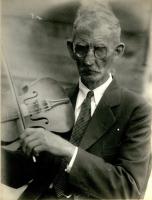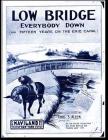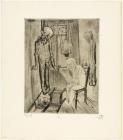My song is founded on the truth,
In poverty we stand.
How hard the millionaire will crush
Upon the laboring man.
The miner's toiling under ground
To earn his daily bread;
To clothe his wife and children
And see that they are fed.
Some are from Kentucky,
The place known as my birth;
As true and honest-hearted man
As ever trod this earth.
The Governor sent the convicts here
And works them in the bank;
The captain and his soldiers
Are leading by in rank.
Although the mines are guarded,
The miners true and fair,
They mean to deal out justice,
A living they declare.
The corruption of Buchanan
Brought the convicts here,
Just to please the rich man
And take the miner's share.
The miners acted manly
When they turned the convicts loose;
You see, they did not kill them
And gave them no abuse.
But when they brought the convicts
They boldly marched them forward;
The miners soon were gathered
And placed them under guard.
Soon the miners did agree
To let them take their place;
And wait the legislature
To act upon the case.
The law has made no effort
To lend a helping hand;
To help the struggling miner
Or move the convict band.
Buchanan acted cruelly
To put them out to toil.
He says he has not room enough
For the convicts in the wall.
He has no law to work them
Only in the pen.
Why should they be on public work,
To rob the laboring man?
I am in sympathy with the miners,
As every one should be.
In other states they work free labor,
And why not Tennessee?
The miners true and generous
In many works and ways,
We all should treat them kindly,
Their platform we should praise.
The Lord in all His wisdom
Will lend a helping haud,
And if we hold out faithful,
God will strive with man.
He gives us happy sunshine,
A great and glorious light;
He'll give us food and raiment
If we'll only serve him right.
In poverty we stand.
How hard the millionaire will crush
Upon the laboring man.
The miner's toiling under ground
To earn his daily bread;
To clothe his wife and children
And see that they are fed.
Some are from Kentucky,
The place known as my birth;
As true and honest-hearted man
As ever trod this earth.
The Governor sent the convicts here
And works them in the bank;
The captain and his soldiers
Are leading by in rank.
Although the mines are guarded,
The miners true and fair,
They mean to deal out justice,
A living they declare.
The corruption of Buchanan
Brought the convicts here,
Just to please the rich man
And take the miner's share.
The miners acted manly
When they turned the convicts loose;
You see, they did not kill them
And gave them no abuse.
But when they brought the convicts
They boldly marched them forward;
The miners soon were gathered
And placed them under guard.
Soon the miners did agree
To let them take their place;
And wait the legislature
To act upon the case.
The law has made no effort
To lend a helping hand;
To help the struggling miner
Or move the convict band.
Buchanan acted cruelly
To put them out to toil.
He says he has not room enough
For the convicts in the wall.
He has no law to work them
Only in the pen.
Why should they be on public work,
To rob the laboring man?
I am in sympathy with the miners,
As every one should be.
In other states they work free labor,
And why not Tennessee?
The miners true and generous
In many works and ways,
We all should treat them kindly,
Their platform we should praise.
The Lord in all His wisdom
Will lend a helping haud,
And if we hold out faithful,
God will strive with man.
He gives us happy sunshine,
A great and glorious light;
He'll give us food and raiment
If we'll only serve him right.
envoyé par Dead End - 26/9/2012 - 17:06
×
![]()









Testo trovato su Mudcat Café
Interpretata da Mike Seeger
Il motivo dello scontro era molto serio.
Crollato il sistema schiavistico, a molti vecchi e nuovi padroni del sud venne in mente che la perduta forza lavoro a costo zero costituita dai negri poteva essere almeno in parte recuperata attingendo con costi bassissimi all’altrettanto ingente e costante serbatoio di braccia costituito dai detenuti (che oltre tutto erano in gran parte negri come gli schiavi di prima). In alcuni Stati i padroni stipularono delle vere e proprie convenzioni con il governo e l’amministrazione carceraria nelle quali “affittavano” il lavoro dei prigionieri in cambio delle spese per il loro mantenimento e la manutenzione delle carceri. Per i minatori salariati, molti dei quali già organizzati in proto-sindacati come il Knights of Labor, i “convicts leased out”, i “detenuti in affitto”, non erano altro che dei crumiri che toglievano loro il lavoro, benchè quelli, poveretti, non ne potessero nulla.
Insomma, con la scusa della ricostruzione dopo la devastante Guerra Civile, Stato e padroni avevano trovato una bella intesa d’affari: lo Stato non doveva scucire gran che per le carceri, i padroni avevano un costo del lavoro bassissimo e profitti lucrosissimi ed entrambi lo mettevano nel culo ai lavoratori liberi e salariati, tenuti sotto scacco ed impediti nella richiesta di qualsiasi miglioramento economico.
Nell’aprile del 1891 a Briceville, Anderson County, Tennessee, i minatori fecero alla Tennessee Coal Mining Company due semplici richieste: primo, di essere pagati in denaro corrente e non in assegni spendibili solo negli spacci gestiti dalla compagnia stessa; secondo, che colui che pesava i carrelli di carbone in base ai quali i lavoratori venivano retribuiti fosse uno di loro e non uno specialista delegato dalla compagnia. Due richieste sensate che però i padroni non accettarono. E quando i lavoratori scesero in sciopero, quelli non fecero una piega, tanto erano già d’accordo che il governatore Buchanan avrebbe mandato alla miniera un bel pò di detenuti in affitto.
La continuità della produzione era assicurata.
La compagnia ebbe inoltre l’ardire di smantellare molte delle povere abitazioni di legno dei minatori per costruire un campo per i detenuti in affitto in arrivo.
A quel punto – siamo a metà luglio del 1891 – alcune centinaia di minatori armati circondarono il campo e costrinsero le guardie alla resa.
Il 16 luglio il governatore Buchanan se ne arrivò a parlamentare con i minatori, ma non era solo: si era portato i soldati come scorta.
Lasciati a guardia del campo, anche questa volta pure i soldati del governatore furono costretti alla resa dal numero soverchiante – circa 2.000 – di minatori armati, le cui fila erano state rinforzate da centinaia di compagni provenienti dalla miniere del confinante Kentucky.
A questo punto Buchanan prese tempo, fece finta di stare dalla parte dei lavoratori, disse che ci voleva del tempo per cambiare le leggi che consentivano l’affitto dei detenuti e ottenne così una tregua da parte degli scioperanti. Il dibattito in seno alle istituzioni statali si concluse in agosto con una conferma del sistema e con l’autorizzazione al governatore ad usare ogni mezzo necessario per ristabilire l’ordine a Briceville.
Il 31 ottobre 1891 la rabbia dei minatori si scatenò: attaccarono i campi dove alloggiavano i detenuti destinati al lavoro e ne liberarono a centinaia e bruciarono molte proprietà della compagnia.
Il governatore mandò centinaia di soldati che dispiegarono pure alcune mitragliatrici pesanti…
Per mesi minatori e soldati si fronteggiarono in brevi ma frequentissimi scontri a fuoco e molti furono i feriti e i morti da entrambe la parti.
Nell’agosto del 1892 gruppi di minatori armati attaccarono simultaneamente le guarnigioni dei soldati, riuscendo pure a catturarne il comandante.
In tutta risposta, il governatore Buchanan promosse la costituzione di gruppi di vigilantes e, quando anche questi furono vittoriosamente affrontati dai minatori, mandò nuovi ed ingenti rinforzi militari che rapidamente riportarono l’ordine, arrestando tutti i capi dello sciopero.
Ma la vicenda, durata così a lungo e costata tanti morti e tanti soldi, segnò la fine della carriera politica di Buchanan, ed il suo successore pose subito fine al sistema dei detenuti in affitto, costretti a farsi crumiri contro i lavoratori liberi. (fonte: en.wikipedia)